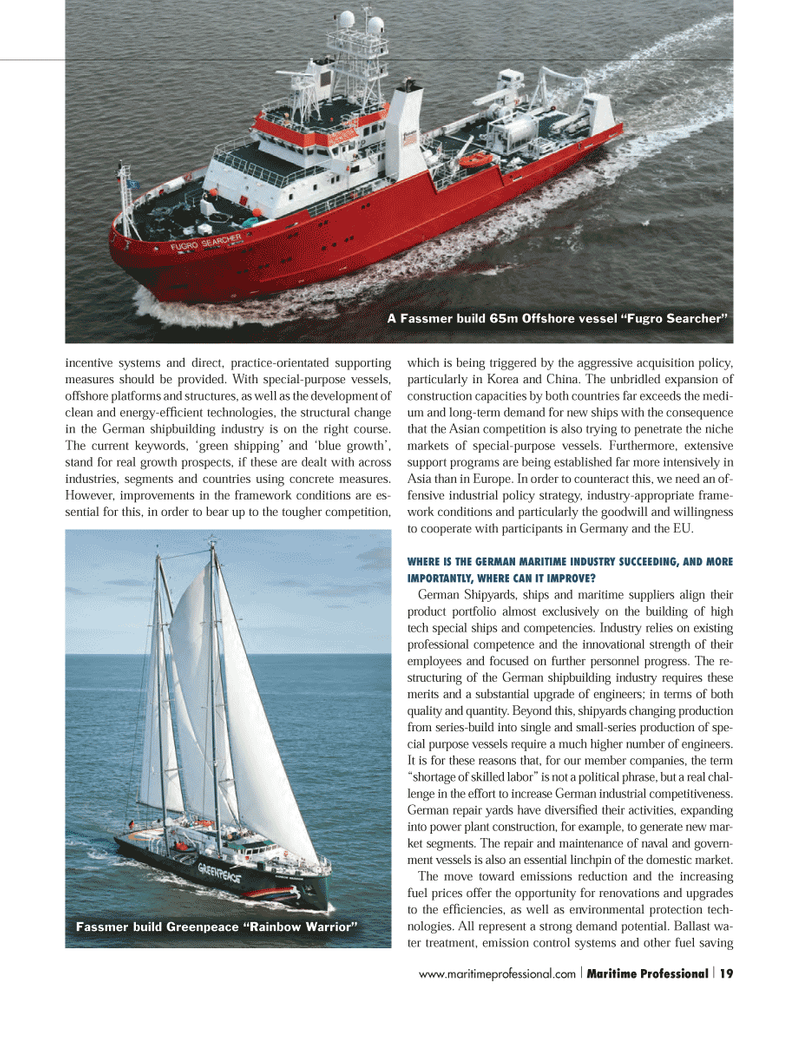
Page 19: of Maritime Logistics Professional Magazine (Q3 2012)
Classification Societies, Quality & Design
Read this page in Pdf, Flash or Html5 edition of Q3 2012 Maritime Logistics Professional Magazine
incentive systems and direct, practice-orientated supporting measures should be provided. With special-purpose vessels, offshore platforms and structures, as well as the development of clean and energy-efÞ cient technologies, the structural change in the German shipbuilding industry is on the right course. The current keywords, Ôgreen shippingÕ and Ôblue growthÕ, stand for real growth prospects, if these are dealt with across industries, segments and countries using concrete measures. However, improvements in the framework conditions are es- sential for this, in order to bear up to the tougher competition, which is being triggered by the aggressive acquisition policy, particularly in Korea and China. The unbridled expansion of construction capacities by both countries far exceeds the medi- um and long-term demand for new ships with the consequence that the Asian competition is also trying to penetrate the niche markets of special-purpose vessels. Furthermore, extensive support programs are being established far more intensively in Asia than in Europe. In order to counteract this, we need an of-fensive industrial policy strategy, industry-appropriate frame- work conditions and particularly the goodwill and willingness to cooperate with participants in Germany and the EU. WHERE IS THE GERMAN MARITIME INDUSTRY SUCCEEDING, AND MORE IMPORTANTLY, WHERE CAN IT IMPROVE? German Shipyards, ships and maritime suppliers align their product portfolio almost exclusively on the building of high tech special ships and competencies. Industry relies on existing professional competence and the innovational strength of their employees and focused on further personnel progress. The re- structuring of the German shipbuilding industry requires these merits and a substantial upgrade of engineers; in terms of both quality and quantity. Beyond this, shipyards changing production from series-build into single and small-series production of spe- cial purpose vessels require a much higher number of engineers. It is for these reasons that, for our member companies, the term Òshortage of skilled laborÓ is not a political phrase, but a real chal- lenge in the effort to increase German industrial competitiveness. German repair yards have diversiÞ ed their activities, expanding into power plant construction, for example, to generate new mar- ket segments. The repair and maintenance of naval and govern- ment vessels is also an essential linchpin of the domestic market. The move toward emissions reduction and the increasing fuel prices offer the opportunity for renovations and upgrades to the efÞ ciencies, as well as environmental protection tech- nologies. All represent a strong demand potential. Ballast wa- ter treatment, emission control systems and other fuel saving A Fassmer build 65m Offshore vessel ?Fugro Searcher? Fassmer build Greenpeace ?Rainbow Warrior? www.maritimeprofessional.com | Maritime Professional | 19

 18
18

 20
20
